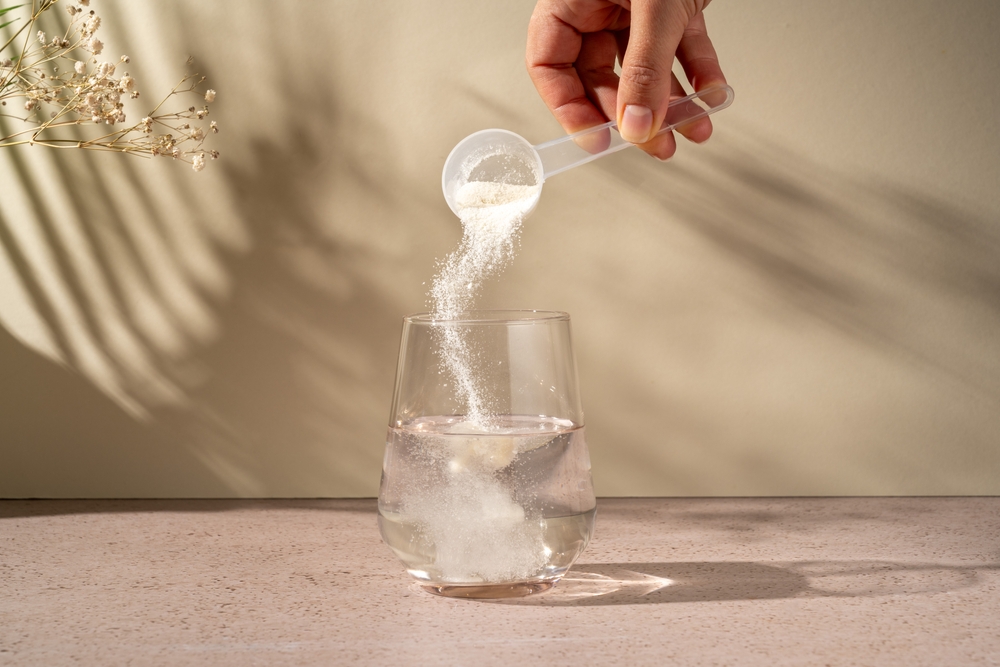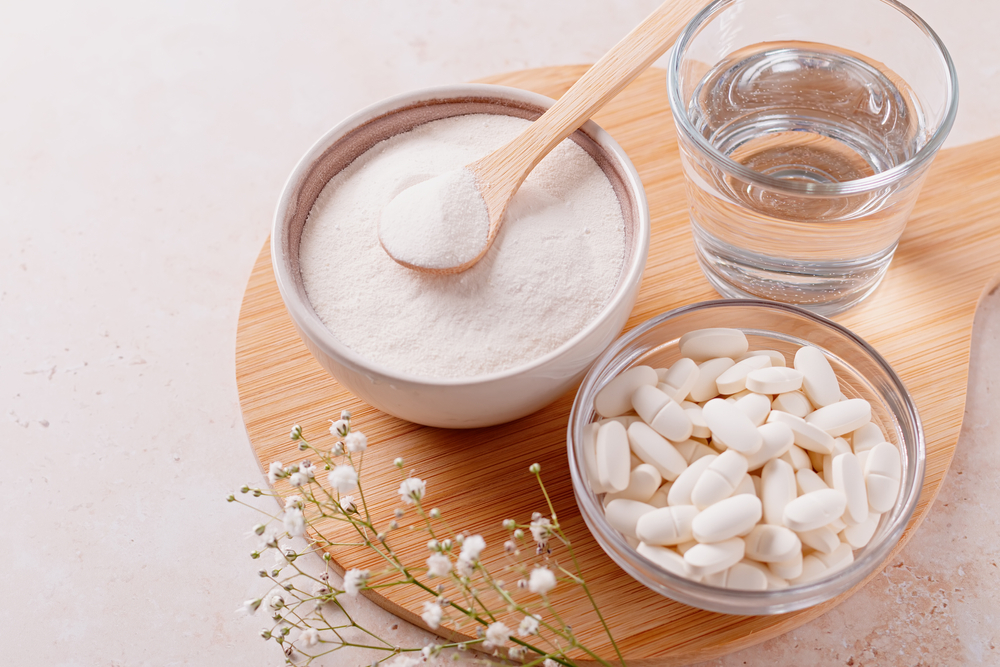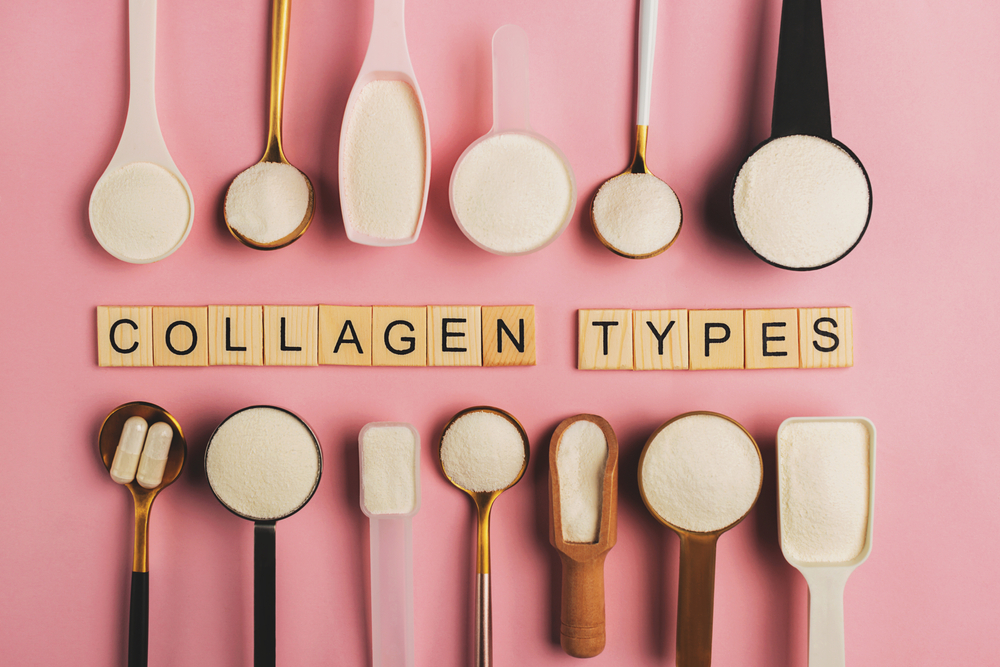
Are you looking for the perfect ingredient to enhance the quality and efficacy of your nutraceuticals? If so, collagen might be a good choice.
This buzz-worthy ingredient has taken the health and beauty industry by storm, linked to all kinds of benefits like skin elasticity and joint health – but it plays a different kind of role in nutraceutical manufacturing.
With so many different types of collagen available, how do you choose the best one – and what should you be looking for? Are they more or less interchangeable? We’ll take a closer look in this post.

What Is Collagen?
Collagen is a protein that is naturally found in our bodies, with over 30% of our total protein being made up of collagen. It’s found in our skin, bones, tendons, cartilage, and even our connective tissue, and it’s responsible for giving these structures their strength and elasticity.
It typically comes from animal products, like bone broth, chicken, and fish. There are also plant-based options, such as algae and soy-based products.
Collagen is an important supplement for all kinds of people, from the elderly looking for supplements to keep their joints healthy to athletes who want to improve their ability to compete. It’s also popular with those who care about nail and hair health.
In the nutraceutical world, collagen is an important ingredient in supplements, either by itself or when combined with other ingredients, because it can help people replenish the collagen levels in their bodies in an efficient, easy way. It’s often combined with ingredients that complement it, like vitamin C (which helps with collagen synthesis) or hyaluronic acid (which helps with hydration).

Understanding Different Types Of Collagen
Now that you know what collagen is, you might be wondering how to best include it in your products. First, know that there are several different types of collagen to pay attention to. There are more than 28 different types of collagen, but types I, II, and III are the most commonly used in supplements.
Let’s break them down.
Type I Collagen
This type of collagen is the most abundant in our body and is found in our skin, bones, tendons, and ligaments. It’s known for its ability to maintain the structure and elasticity of our skin and promote wound healing. Type I collagen supplements are often used for anti-aging benefits and to improve skin health. They can also help support bone and joint health.
Type I collagen is derived from bovine, porcine, and marine sources. Bovine and porcine collagen supplements are usually sourced from the hides of pigs and cows. As you might expect, marine collagen is extracted from fish skin and scales. Some may even be made from eggshells. The most common source is from cows.
Type I collagen supplements are typically made from hydrolyzed collagen peptides, making them easily digestible and absorbed by the body. This type of collagen has a high bioavailability, which means it’s readily absorbed and utilized by the body.
Type II Collagen
This type of collagen is primarily found in cartilage and makes up a significant amount of the protein content in our joints. As such, it’s essential for maintaining healthy joints, reducing inflammation, and promoting joint flexibility. Type II collagen supplements are often used to improve joint health and reduce joint pain and stiffness.
This type of collagen is sourced from marine and chicken cartilage, in most cases.
Type II collagen supplements are usually made from undenatured collagen, which means the collagen molecules are left in their natural, intact form. The collagen tends to be less tightly packed, which means it may be somewhat easier for the body to break down and absorb.
Type III Collagen
This type of collagen is found in our skin, blood vessels, and internal organs. Often, type III collagen is used to support muscles, blood vessels, the gut, and the uterus.
It’s unique from other types of collagen because it has a singular alpha chain (compared to the others, which have multiple). It’s primarily sourced from bovine sources.

Choosing The Right Form: Powder, Liquid, Or Capsule?
Now comes another question – what form of collagen should you be using in your products?
First up, we have powder collagen. This is a popular choice as it is easy to mix into beverages or food and is readily absorbed by the body. Plus, it’s versatile and can be used in a variety of products.
Next, we have liquid collagen. This form is convenient for those who prefer to drink their collagen supplement rather than mix the powder into their food or drinks. It also contains fewer processing additives compared to powder collagen, making it a more natural choice. That said, it has a shorter shelf life compared to powder collagen.
Capsule collagen is another option. It is easy to take on the go and ideal for those who don’t like the taste of collagen in their beverages or food. Capsules also have a longer shelf life than liquid collagen, making them a more cost-effective choice in the long run. However, capsules can be difficult for some people to swallow, so consider that and your target audience when you’re manufacturing your product.
After all, ultimately, the form of collagen you choose will depend on your product’s target audience and the specific benefits you want to offer. Whichever form you choose, be sure to use high-quality collagen that is sustainably sourced and has undergone rigorous testing for purity and potency.
Considerations For Dietary Restrictions
One of the most important factors to consider when selecting a type of collagen is whether it fits within various dietary restrictions.
For example, if your target market includes individuals who may be more likely to suffer from allergies or aversions to certain animal proteins, you may want to avoid collagen sourced from specific animals. Or if your customers have religious or ethical dietary restrictions, you may want to consider vegetarian or vegan options – for example, if you’re trying to market a kosher product, you’ll want to stay away from any collagen sourced from pig products.
More and more consumers are becoming vegetarian or vegan, in general, and they may not want to consume animal products in any form. Consider offering alternative sources of collagen for this group, such as plant-based sources like algae, chia seeds, or flaxseeds.
Besides dietary restrictions, allergen information is another crucial factor to consider when choosing a type of collagen. Allergen information should be readily available, easy to read, and accurate for your customers. Depending on your target market, you may consider offering allergen-free nutraceuticals.

Bioavailability And Absorption Rates
Bioavailability refers to the percentage of a nutrient that is absorbed and utilized by the body. A critical factor to consider when picking the best collagen type for your nutraceuticals is bioavailability and absorption rates.
Different types of collagen have different bioavailability and absorption rates, affecting how well the body can utilize the collagen. Look for collagen types that have high absorption rates to ensure that your customers are getting the most out of your nutraceutical product.
Also, remember that apart from the different types of collagen, several other factors influence collagen absorption rates. These may include the following:
- Age: As we age, our bodies may absorb collagen less efficiently.
- Stress: High levels of stress can impact collagen absorption rates.
- Micronutrient deficiencies: When your body has inadequate micronutrients – such as vitamin C, iron, and copper – it may hamper collagen absorption.
If you’re concerned about this, there are several ways to enhance the bioavailability of collagen, including:
- Paired micronutrients: Some micronutrients, such as vitamin C and copper, are essential for collagen production and can help enhance its bioavailability.
- Hydrolyzed collagen: Hydrolyzed collagen is a type of collagen that is broken down into smaller particles, making it easier for the body to absorb and utilize. This type of collagen may be an excellent option for your products.
- Multiplicity: Opting for a variety of collagen types with various absorption rates may increase the overall bioavailability of your products.
Considering Customer Preferences And Trends
Finally, remember to always keep your customer preferences and trends in mind when selecting the best type of collagen for your nutraceuticals. For example, some customers may prefer collagen products that are tasteless and odorless, while others may prefer flavored options.
Similarly, some customers may look for all-natural options with minimal additives, while others may prioritize convenience and prefer pre-packaged or ready-to-mix options. Consumer preferences often change, so keep updating your offerings as needed and conduct regular research to gain more insight into what your particular demographic is looking for.
With all said and done, picking the best type of collagen for your nutraceutical products is no easy task. With so many options on the market, it’s crucial to do your research and choose a collagen type that fits your brand’s values and goals.
Get Your Collagen Product Made With SMP Nutra
Whether you opt for marine collagen for its sustainable sourcing or bovine collagen for its effectiveness in joint health, SMP Nutra has got you covered.
As a trusted dietary supplement manufacturer, we provide a range of collagen formulations for you to choose from, along with expert label designers and impressive packaging options to help your brand stand out.
So why settle for anything less? Check out SMP Nutra today and let us help you elevate your nutraceutical game.

